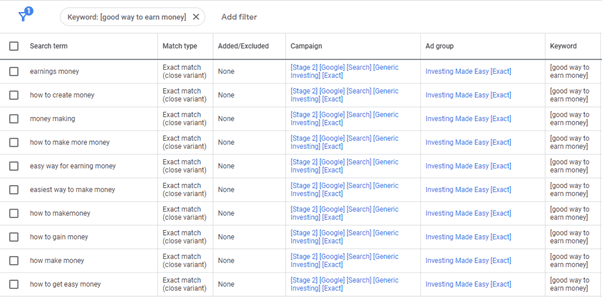Intro
Match Types are one of the fundamental aspects of search engine marketing. “Why are they so fundamental?” I hear you ask. Well, match types are a digital marketer’s best friend when it comes to dictating what search terms you allow your ads to be shown in, allowing us to broaden or restrict how wildly we let the algorithm run when it comes to showing our ads. There are 3 match types: Broad, Phrase and Exact.
Broad
Broad is the default match type, and it is the most, you guessed it, broad of the three, allowing your ad to be shown in a number of different search terms with different themes and intents Google deems related to your keyword. For example, if we entered Red Shoes as a broad match keyword for our ad group selling red trainers, our advert would show for a number of different search terms, potentially ranging from Shoe Polish to Red Insoles for Flat Feet. Google likes to suggest broad match as the default as is it the most hassle/work free of the match types, you enter your semantic umbrella term and let the algorithm get to work. The other (alleged) reason that Google wants you to use broad match is that it gives you the worst ROAS due to the irrelevant traffic it brings, causing you to spend more money, lining their pockets further (allegedly). There are occasions when broad match can be useful. Say for example, if the service your business provides encompasses a large range of searches related to a topic (check out our LinkedIn post); or if your aim is just to drive traffic to your website, no matter the relevance; or if your boss asked you to set up a new paid search account which you forgot to do and only have half an hour until you have to present it to them. Obviously, these are very specific situations we don’t find ourselves in too often, so here at House of Performance we tend to focus our efforts on phrase and exact match types.
Phrase
Phrase match types are denoted by quotation marks. Phrase match finds a harmony between volume and relevance through filtering many of those unnecessary and irrelevant search terms from broad match out by only allowing your ads to be triggered by search terms that include your keyword in its entirety at some point in their search term. Using “red shoes” as our keyword, if someone entered red shoes for sale as a search term, this would trigger the ad as it contains the keyword in it, as would Adidas red shoes, which, if we were selling Nike trainers, wouldn’t necessarily be a keyword we would want to show up for.
Exact
Cue exact match. Exact match is like owning a classic car. It requires the most work, maintenance, care, and attention, but ultimately it is the most rewarding of the three match types. Only search terms that are our exact keyword (or keywords deemed close variants by Google) will appear, denoted by [ ] brackets around the keyword. Coming back to our red shoes example, if we had [red adidas shoes] in our keyword list, a search term of red shoes wouldn’t trigger our ad, nor would adidas shoes, or red adidas shoes for sale (in theory, keep reading!).
Negatives
Negative keywords are also worth mentioning, as these do the opposite of keywords in that if a search term contains them, our ads will not appear. They can also be filtered by match type and are really important for steering our ads towards the traffic we want and away from that which we don’t want. We wouldn’t want our ad for red adidas shoes to trigger anything regarding Nike, and so we’d include Nike as a broad match type. Equally, if our ad was for low top shoes we’d want high top trainers to be excluded, so we’d include high top as a broad match, but also variations of “high top red adidas shoes” as a phrase and variations of [red high top adidas shoes] as exact matches in order to ensure the people that our ads are shown to are looking for what our ad is showing them (red low top adidas shoes).
Close Variants
There is also the caveat of close variants, a feature where search terms including synonyms and/or with similar semantic meaning to your keywords also trigger your ad. Below is an example from our account of how close variants can work for or against you, depending on how often you review search terms report. This is why the explanation of match types is often a theoretical ideal, rather than reality, as Google’s algorithm will pull in all kinds of weird and wonderful ‘close variants’. This is why its important to continually review your search terms report in order add and exclude search terms before they consuming your hard earned budget.

Our Match Type Strategy
At HoP we tend to follow a specific strategy of a comprehensive exact match keyword list supplemented by phrase match keywords, Although broad match deserves mentioning for its ability to effectively increase traffic when trying to scale (with an exhaustive negative list!). Exact match keywords are brilliant for filtering out everything except the keywords that we want our ads to show for, but its important when using them that we cover all ground with our keywords to not restrict ourselves and miss out on valuable search traffic and subsequently potential conversions. If you’re willing to put in the time and effort into creating an exhaustive exact match keyword list, this can provide you with the most relevant traffic for your business goals. This strategy gives you the most control of how your ads are shown, but is the most time and effort consuming. Using this strategy supplemented with phrase keywords in order to ‘fill in the gaps’ between exact match keywords while continually reviewing search terms can help exclude irrelevant searches while adding those you might have missed gives you the greatest level of control to steer Google’s search algorithm to produce the highest returns for you.
Got questions about PPC match types? Get in touch, we love a chat!







